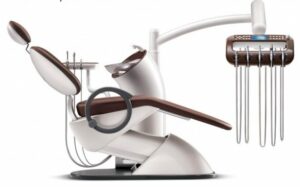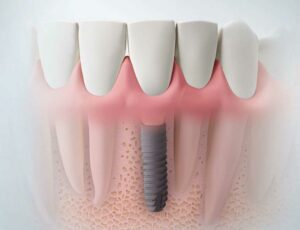Despite dental care improvements, millions of individuals in the U.S. suffer tooth loss — mostly because of periodontal disease, tooth decay and injury. For many years, your only choice of treatment for missing teeth were dentures and bridges. Today, however, you also have the option of dental implants.
Dental implant surgery could provide you with a welcome alternative to bridgework or dentures that don’t fit well. They’re also an option when there’s a lack of natural teeth roots making it so your dentist can’t build bridgework or denture tooth replacements. In fact, three million individuals in the U.S. alone have dental implants, and this number is growing by 500,000 every year.
If you’re thinking about getting dental implants, you probably have a lot of questions you’d like to ask. In the hopes of answering these questions, we’ve put together the following dental implant FAQ list.
The 20 Most Common Questions About Dental Implants
Here are 20 common questions to ask before a dental implant.
1. What Are Dental Implants?
This is perhaps one of the most common and obvious first questions to ask before dental implants.
A dental implant isn’t an actual tooth, but rather a prosthesis used for replacing missing teeth. Basically, it’s a small titanium fixture the dentist inserts into your jawbone, on top of which the dentist can attach a:
- Fixed bridge
- Single crown (cap)
- Full denture
- Partial denture
After the implant integrates to the bone, the dentist connects a structure known as an abutment to your implant and then attaches your artificial tooth or teeth. So, there are three parts to the process — the implant, the abutment and the artificial tooth.
The dentist surgically places dental implants in your jawbone. Implants serve as your missing teeth’s roots. Since the titanium in the dental implants fuses with your jawbone, the dental implants won’t make noise, slip or cause bone damage like dentures or fixed bridgework may. Plus, the materials don’t decay like your natural teeth supporting regular bridgework could.
2. Are Dental Implants Common?
Tooth loss is a prevalent issue. Because of this, dental implant use is also a common practice. There are various reasons why so many individuals are turning to implants to replace their missing teeth or those the dentist can’t save, including:
- To replace individual missing teeth: Many individuals find themselves with a broken or decayed tooth that restorative dental work, such as root canals, crowns and fillings, can’t save. They end up needing to have the tooth removed before infection begins spreading.
- To replace multiple teeth: Since dental implants are incredibly sturdy, they’re successfully used for stabilizing dental bridges.
- For their reliability: One dental implant that’s taken care of properly can last the patient’s lifetime. Dental implants typically last a lot longer than other dental restorations.
- For their appearance: Implants are made to look like natural teeth, making them very aesthetically pleasing.
3. Are Dental Implants Safe?
Dentists have used dental implants for many years, and implant technology continues to advance. Today, dental implants are sophisticated devices that highly trained professionals put in place. They’re one of the most reliable ways to replace missing teeth.
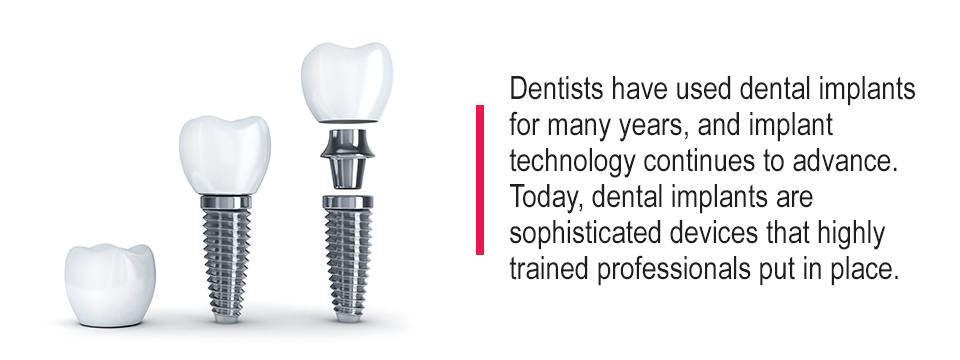
4. How Painful Is Getting a Dental Implant?
While discomfort can vary between people, most individuals report getting their dental implant was much less uncomfortable than they anticipated it to be. During the surgical dental implant procedure, the dentist will give you an anesthetic, so you should feel minimal discomfort if any.
They’ll use gentle techniques, and since the environment they’re working in is clean, there’s little risk of infection. If you follow the dentist’s post-operative instructions and take the prescribed antibiotics, you should experience minimal discomfort. Your dentist will likely prescribe you pain medication as well, but many individuals don’t use them.
5. How Long Does a Dental Implant Procedure Take?
A few factors determine the dental implant procedure timeline. They are:
- Your dental health
- Which teeth are replaced
- The number of teeth involved
- If you’ll require a tooth extraction before the implant placement
The dentist restores your mouth with an implant in two phases and the entire process can take around three to nine months. It could take even longer if you have an extraction that has to heal, or if you needed bone grafts before the dentist implanted the posts.
6. What Is the Downside of Dental Implants?
Similar to any oral surgical procedure, there is a chance of infection, pain and inflammation. However, negative effects are rare and usually minor if they do occur. Your dentist will talk with you about how they can manage these risks for your specific situation.
Also, if the dentist can’t place the implant because there’s no available bone, then you may require a bone and gum grafting procedure, which could increase your treatment cost.
7. What Is the Upside of Dental Implants?
Fortunately, humans get two sets of teeth. When you lose a single tooth or multiple teeth because of gum disease or dental decay, implants can now replace them and serve as your third set of fixed teeth. Implants have many upsides, including:
- They improve your appearance
- They improve your confidence
- They can last a lifetime
- They allow you to have an active lifestyle
- They improve your ability to eat the foods you like
- You no longer have to worry about your teeth
- They never decay because they’re made of titanium
Dental implants, in general, have an up to 98 percent success rate.
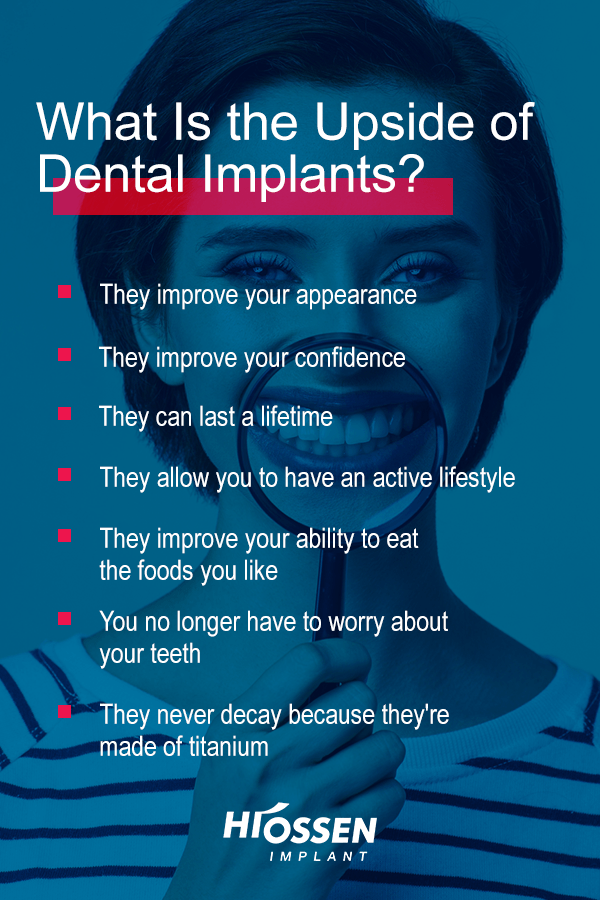
8. What Can I Eat After Dental Implant Surgery?
For two days following your surgery, drink liquids and consume soft foods only like:
- Eggnog
- Milkshakes
- Cooked cereals
- Yogurt
- Smooth soups
- Cottage cheese
- Ice cream
- Mashed potatoes
- Protein shakes
- Fruit smoothies
- Refried beans
- Pudding
On day three following your surgery, eat soft foods that don’t require much chewing like:
- Cooked noodles
- Macaroni and cheese
- Soft sandwiches
- Poached, soft-boiled or scrambled eggs
Avoid crunchy or tough foods like rice, pizza, hamburgers and popcorn. Avoid acidic and spicy foods. Most individuals resume their regular diet seven days after their surgery.
9. How Soon After a Tooth Extraction Can You Have an Implant?
The dentist places dental implants in your jaw by making precise holes in your bone so that they fit snuggly. They do this where your teeth are missing but where you have adequate bone to hold the dental implants. In some cases, it’s possible for them to place dental implants on the same day your dentist extracts your teeth. Typically, however, it takes around three to six months of healing before you can have your implant placed.
10. Can Your Mouth Reject an Implant?
Very rarely does an individual’s body reject an implant. The jawbone usually readily accepts the dental implant. The very few rejections are due to rare allergies to the titanium alloy that make up the implant. Another reason why an implant could fail is if you don’t take proper care of it after your surgery. Without excellent oral hygiene, natural teeth fail and fall out eventually. Dental implants are no different. When you take good care of your teeth and your implants, it will help prevent gum decay and structure failure later on.
11. How Long Does It Take for Dental Implants to Heal?
The average implant process occurs in multiple steps. You may require more than one healing stage. So, there’s a varied healing period, depending on your health, how many teeth you need replacing and other factors. However, the healing process generally takes anywhere from six to 12 weeks.
12. What Can You Not Do After Dental Implant Surgery?
First, you shouldn’t smoke. Smoking causes gum disease and recession, which makes the dental implant structure weak over time. Therefore, you should not smoke or chew tobacco.
Also, don’t apply any heat to your face unless you’re instructed to by your dentist. Heat could increase swelling.
Don’t use straws. Doing so places pressure on your mouth that could dislodge the blood clot that’s keeping the wound closed, cause more bleeding and delay healing.
13. Can You Remove Dental Implants or Do They Stay in Your Mouth?
You can’t remove dental implants because they’re fixed right into your bone, replacing your teeth in a way that’s closest to your natural teeth.
14. Who Are Good Candidates for Dental Implants?
To be a good candidate for implants, you need to have good oral and general health. You also need to have adequate bone in your jaw to support the dental implant, be free of periodontal disease and have healthy gum tissues.
In general, you may be a good candidate for dental implants if you:
- Have one or more teeth missing
- Have enough bone for securing the dental implant or can have a bone graft
- Have a fully grown jawbone
- Have healthy oral tissues
- Are unwilling or unable to wear dentures
- Don’t have a medical condition that would affect bone healing
- Would like to improve your speech
- Can commit a few months to the process
- Don’t smoke or are willing to quit
15. Can You Turn Dentures Into Implants?
No, dentures can’t be “made into implants.” Dental implants are metal screws the dentist places into your jawbone to help support and anchor your artificial teeth (dentures). It might be possible for your dentist to place the implants beneath existing dentures to help stabilize and support them. However, the dentist can only do this if your existing dentures are in excellent condition. The dentist will examine your existing dentures to determine their condition.
16. How Do Implants Help If I Have Partial or Full Dentures?
Individuals who wear partial or full dentures are the most frequent users of dental implants. Dental implants can help provide support and retention for a removable implant overdenture that the dentist snaps on your implants. Implants help ensure that the full or partial denture doesn’t move and decreases the need for denture glue or adhesives. You can also use implants with a fixed denture. The dentist may bolt your dentures to the dental implants using titanium components.
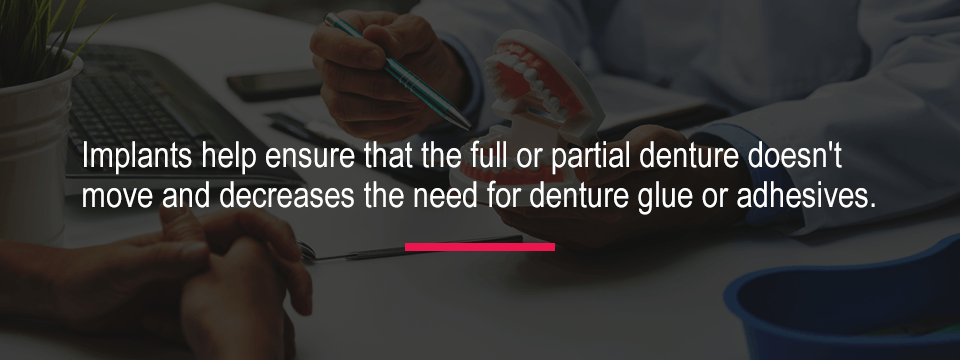
17. How Long Do Implants Last?
Dental implants can last a lifetime if you take care of them properly by regularly brushing, flossing and following your dentist’s recommendations. While your dentist can’t guarantee the lifetime success of an implant, they can provide you with suggestions and guidelines on how to take good care of your teeth. They’ll base these guidelines on:
- Your genetic history
- Proper hygiene procedures
- Your nutritional habits
Following the guidelines your dentist gives you will help ensure your implant has the best chance of lasting a lifetime.
18. Does the Dental Implant Procedure Hurt?
Most implants procedures are less uncomfortable than a tooth extraction. Most dentist offices have staff and dentists trained to safely provide conventional anesthesia methods along with other intravenous sedation anesthesia choices. When you choose effective IV and local anesthesia, your operative procedure will seem both brief and pleasant.
19. Will Insurance Cover Dental Implants?
Typically, dental insurance doesn’t cover implants. But, more companies are realizing the need for these procedures, so there are some dental insurance plans that cover implants. In many cases, your insurance may help pay for teeth the dentist places on your implants, if not your dental implants themselves. You may want to call your insurance provider and see if you have coverage for your implants.
20. How Much Do Implants Cost?
This is a complicated question since the answer will depend on your specific situation. In obtaining this answer, you’ll learn more about your specific needs. Your dentist can give you a more accurate assessment of the costs of your procedure.
The cost of dental implant treatment will depend on various individual factors, including:
- The amount, quality and location of bone
- The number of dental implants you’ll need to support the teeth
- The number of teeth that need replacing
- The type of artificial teeth the dentist will use
- The types of dental implants used
This is something you can discuss with your dentist during your initial consultation.
Contact Hiossen® Implant to Schedule Your Dental Implant Consultation
At Hiossen, we’re committed to providing you with outstanding and innovative implant technology that’s just as grounded and reliable as our company. We’ve become one of the top five dental implant companies worldwide through our commitment to developing high-quality, innovative, safe and effective dental implants. We’re always conducting rigorous research, testing and clinical studies, using a five-step quality control process and listening to clinician input so that we continue to achieve our mission.
Now that you’ve gone through the most common dental implant questions and answers, contact us at master@hiossen.com or (888) 678-0001 for your initial consultation. If you have any more dental implant exam questions, we can help get them answered during your visit.



